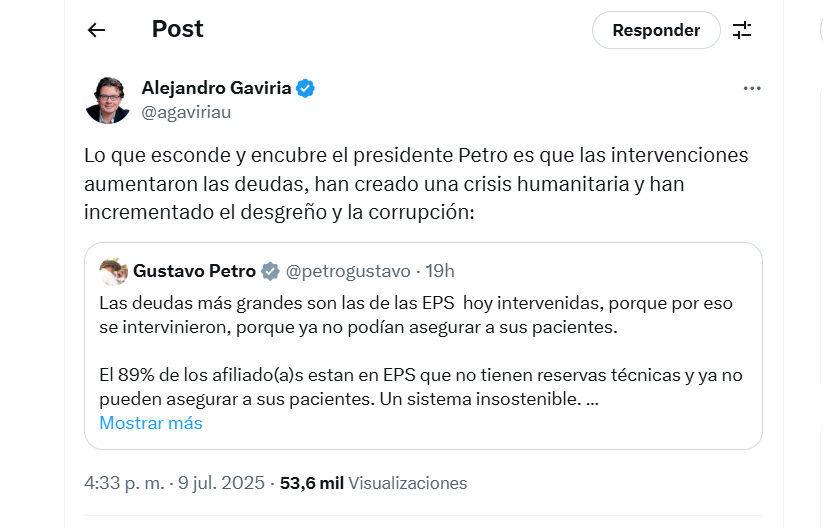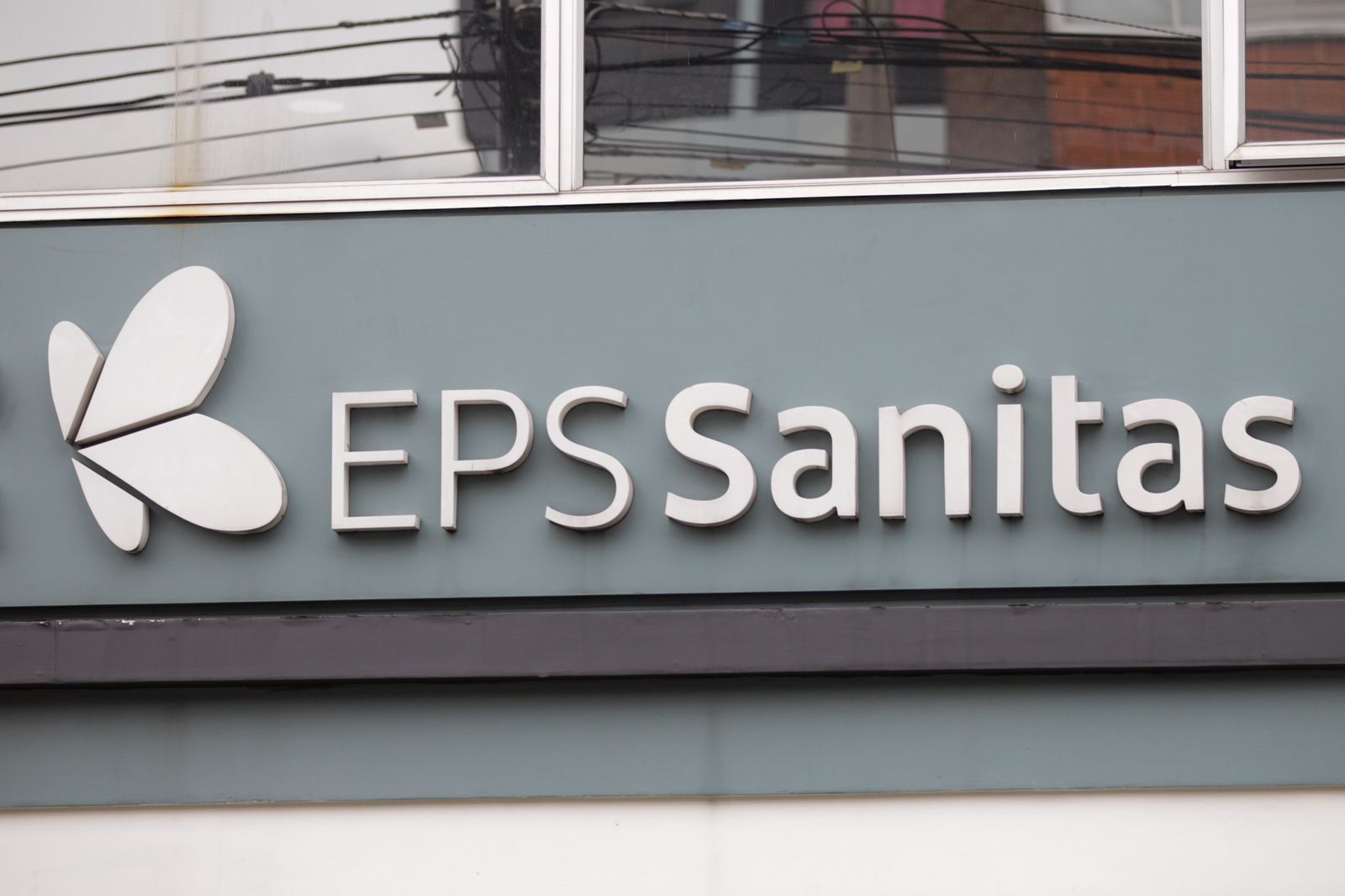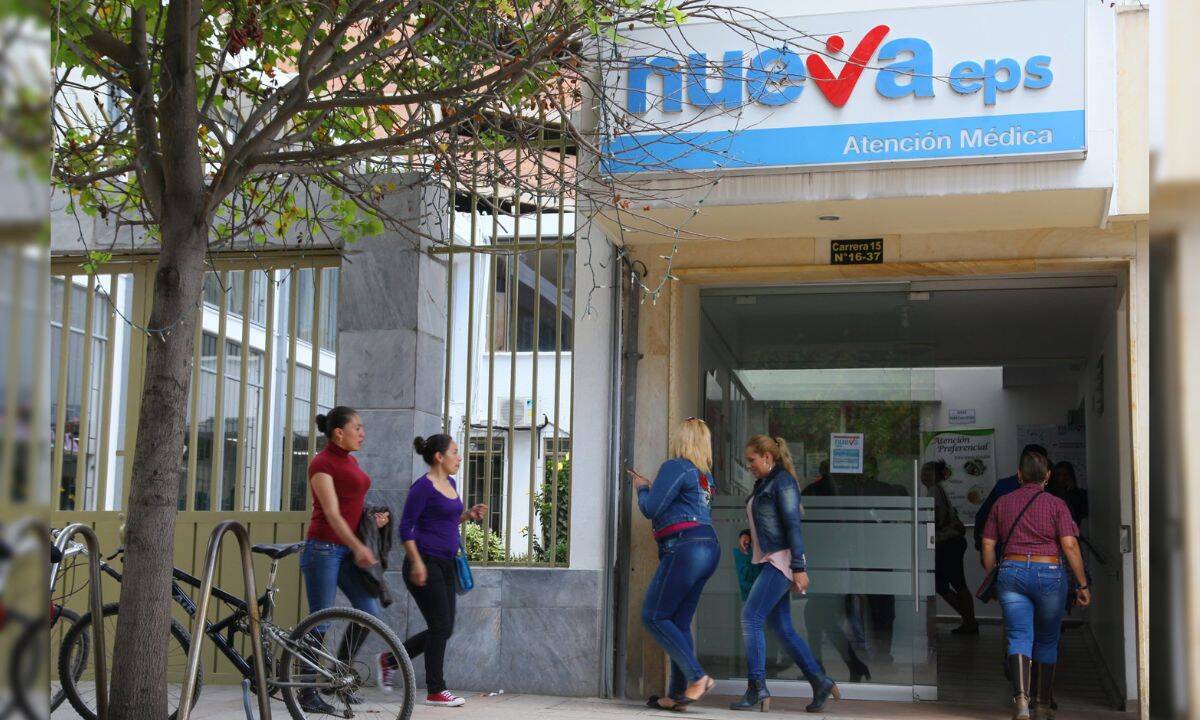'What President Petro is hiding is that the interventions in the EPS increased the debt,' says Alejandro Gaviria.

The government currently controls almost 60 percent of healthcare system users through the National Health Superintendency. For more than a year, nine of these insurers have remained under administrative control of the Superintendency of Health due to poor technical indicators that jeopardized their operations and the provision of healthcare to their members.
However, the intervention of the Supersalud has not improved the indicators of these companies, and, on the contrary, according to publicly available data, the situation has worsened. In response, former Health Minister Alejandro Gaviria lashed out at the government, accusing President Gustavo Petro of directly covering up the increase in debt at intervened EPSs, which has worsened the system's situation and, according to Gaviria, also increased cases of corruption .
"What President Petro is hiding and concealing is that the interventions have increased debt, created a humanitarian crisis, and increased disarray and corruption," said Gaviria, who, despite having served as a minister in the current government, has also become a vocal critic of the actions of President Petro and his Minister of Health, Guillermo Alfonso Jaramillo.

Former minister Gaviria questioned President Gustavo Petro through the social network X. Photo: @agaviriau
Over the past eight years, there has been a sustained increase in PQRS, with a notable peak in the last three years, according to a report by the Así Vamos en Salud Observatory, which compiles data from the Superintendency of Health. In 2017, 449,436 cases were recorded, while in 2024 the figure rose to 1,604,968, an increase of more than 250 percent. For the first time in the history of these records, 2024 surpassed 1.5 million complaints, evidencing a significant increase in citizen dissatisfaction with the healthcare system.
In the case of PQRS (Public Health Insurance Companies) in intervened EPSs, the situation worsens. For Nueva EPS and Sanitas, the report documents increases of 47 and 46 percent, respectively, in the number of complaints following their intervention. The same is true for other entities such as Famisanar, SOS, and Emssanar, where state control measures have failed to reduce user dissatisfaction and, in some cases, have coincided with unprecedented spikes in complaints.
In the case of Sanitas, which, by order of the Constitutional Court, returned to its owners and was no longer controlled by the State, the indicators declined last year, reflecting the discontent of its members. In 2023, Sanitas received a total of 185,634 complaints, and in 2024, it received 221,565, representing a 19 percent increase in complaints and claims from this EPS's users.

The Sanitas EPS returned to the control of Grupo Keralty by order of the Constitutional Court. Photo: César Melgarejo/El Tiempo
In the months prior to the intervention, that is, January, February, and March 2024, Sanitas accumulated 15,071, 15,721, and 14,367 complaints, respectively. A year later, during the Supersalud intervention, the insurer registered 23,495 complaints in January and 20,931 in February 2025. A source close to the intervention told EL TIEMPO that the PQRDs (Reportedly Delinquent Claims) have been the main headache during the process. “ There were complaints averaging 22,000 and 23,000 per month. However, in November (2024), the number dropped to 21,000 ,” the source explained.
The same thing has happened with Nueva EPS. According to Supersalud figures, in February 2024, the PQRD rate at Nueva EPS was 21.26 per 10,000 members, and by February of this year, it had risen to 34.88, the highest figure in the last three years.

Nueva EPS, with more than 11 million members, remains under the control of the Supersalud (Health Superintendency). Photo: Luis Lizarazo García. EL TIEMPO Archive
But the situation at Sanitas and Nueva EPS is not an isolated one. According to data from the Supersalud (Health Superintendency of Health), the rate of complaints per 10,000 members has increased in eight of the nine EPSs under intervention, with the largest increases in Servicios Occidental de Salud (SOS), Famisanar, Nueva EPS, Sanitas, and Savia Salud.
On the other hand, and despite the fact that direct payments have accelerated payments, this year a growing number of Health Care Providers (IPS) and pharmaceutical managers have decided to stop serving Nueva EPS members due to the multimillion-dollar debts the insurer has not paid, which prevents them from continuing to offer services such as hospitalizations and medication delivery.
The State already manages the money, as President Petro requested. A key point to note is that one of the diagnoses President Gustavo Petro's administration has insisted on is that the health crisis is largely due to the fact that private health insurance companies (EPS) are managing resources. That's why one of the cornerstones of the reform bill is that insurance companies would no longer be responsible for managing the country's health funds, which average around $100 billion pesos annually. Instead, Adres, a state entity, would directly transfer funds to and pay hospitals, clinics, and pharmaceutical companies for the services provided to users.
However, given the complex progress of the reform bill in Congress, in April of last year the government issued a decree allowing for changes to the conditions for increasing the funds allocated directly. Thus, the EPSs that did not meet the requirements (which were the majority) would no longer manage health resources, but instead, Adres would directly pay clinics and hospitals, subject to certain parameters.
"The law allows us to make direct payments to public and private hospitals and clinics, and we will do so to make more efficient use of public health resources," said President Gustavo Petro on April 8 of last year, days before the issuance of Decree 0489 of 2024, by which Adres would begin allocating funds to the UPC and the Maximum Budgets.
Barely a year later, the Ministry of Health's decree has yielded results. According to data from Adres, in 2024, $57 of every $100 pesos transferred by that entity to pay for services covered by the UPC did not go through the EPS; instead, they were transferred directly to clinics and hospitals. In total, $48.1 billion pesos of health resources were paid through direct transfers last year. So far this year, as of April, $20.5 billion pesos have been transferred through this mechanism.
In this sense, the government has now achieved, without the need for reform, one of the changes it had most requested to transform the system: that the EPSs not handle the money, but rather that the State would be responsible for paying for what patients receive.
However, as the figures show, the government's direct management of resources has not succeeded in getting the EPSs out of the crisis they are in, as the indicators and figures from the Supersalud (Health Superintendency) clearly demonstrate.
Environment and Health Journalist
eltiempo





